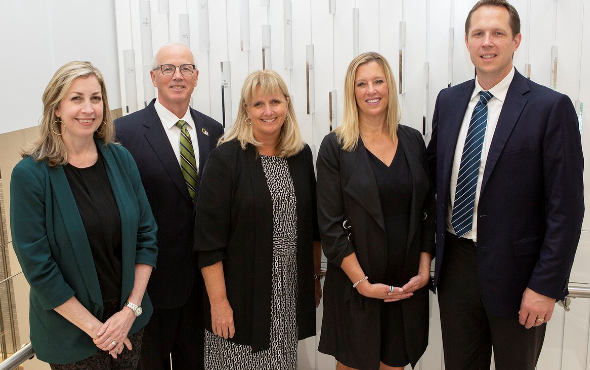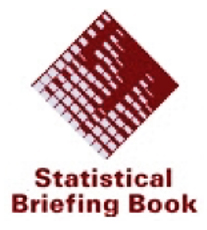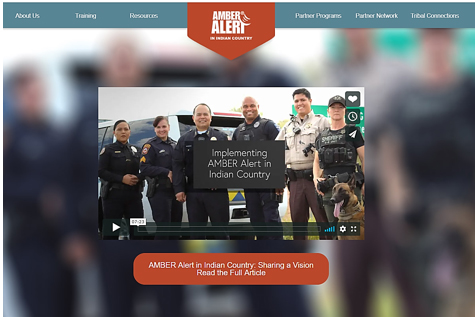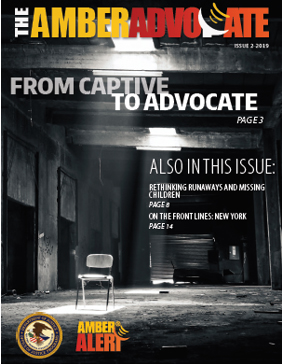Department of Justice Officials Visit New NCMEC Headquarters
 Shown (from l. to r.) are NCMEC Senior Vice President Michelle DeLaune, NCMEC President John Clark, OJJDP Administrator Caren Harp, Office of Justice Programs (OJP) Principal Deputy Assistant Attorney General Katharine T. Sullivan, and OJP Deputy Associate Attorney General Taylor McConkie.
Shown (from l. to r.) are NCMEC Senior Vice President Michelle DeLaune, NCMEC President John Clark, OJJDP Administrator Caren Harp, Office of Justice Programs (OJP) Principal Deputy Assistant Attorney General Katharine T. Sullivan, and OJP Deputy Associate Attorney General Taylor McConkie.On July 19, 2019, the leadership of the National Center for Missing & Exploited Children (NCMEC) provided OJJDP Administrator Caren Harp and other Department of Justice officials a “behind-the-scenes” tour of NCMEC operations at the organization’s new facilities in Carlyle, VA. The move consolidates NCMEC operations, previously carried out in two offices in Alexandria, VA.
Since 1984, OJJDP has supported NCMEC to serve as an information clearinghouse and resource for families of missing and exploited children and the professionals who serve them. Among other activities, NCMEC manages a 24-hour, toll-free missing children’s hotline at 800–THE–LOST; the CyberTipline, a centralized reporting mechanism for public and electronic service providers to report instances of apparent child sexual exploitation; the AMBER Alert secondary distribution program; and the Child Victim Identification Program, which serves as the central U.S. repository for information related to child victims depicted in sexually exploitive images and videos.
“It was truly an honor to see NCMEC’s new headquarters,” said Administrator Harp. “The facility enables all the NCMEC team to work together in one place, and I know this will enhance the team’s collaboration and effectiveness.”
Read this blog post to learn more about the visit and OJJDP's partnership with NCMEC.
OJJDP Adds Court Data to Statistical Briefing Book
 OJJDP has updated its Statistical Briefing Book to include national estimates of delinquency and petitioned status offense cases processed in juvenile courts through 2017.
OJJDP has updated its Statistical Briefing Book to include national estimates of delinquency and petitioned status offense cases processed in juvenile courts through 2017.
Resources include:
- A Data Snapshot describing the characteristics and processing outcomes of delinquency cases handled in juvenile court in 2017.
- The Easy Access to Juvenile Court Statistics data analysis and dissemination tool.
- Answers to frequently asked questions about Juveniles in Court and Juveniles on Probation.
- A Special Topics section, including detailed tables that describe delinquency cases involving Hispanic youth.
Data Snapshot Highlights Youth in Residential Placement
The National Center for Juvenile Justice and OJJDP have released a Data Snapshot that provides an overview of trends and characteristics of youth in residential placement in 2017. The Data Snapshot reports that the number of detained and committed youth in residential placement continues to decline. Following are some highlights:
- There were 43,580 youth in residential placement in 2017.
- Relative declines from 1999 to 2017 were greater for committed youth (65 percent) than for detained youth (45 percent).
- The offense profiles for detained and committed youth (technical violations and status, drug, public order, property, and person offenses) were similar in 2017.
Access the full list of Data Snapshots on OJJDP’s Statistical Briefing Book website.
Juvenile Justice Facility Administrators Training Held in Boston, MA
On August 3–6, 2019, the Council of Juvenile Correctional Administrators (CJCA) offered a pilot training in Boston, MA, for administrators of state and local secure juvenile justice facilities. OJJDP Administrator Caren Harp and Associate Administrator TeNeane Bradford offered remarks on the training’s second day. The training included presentations and workshops on a range of topics, including best practices in facility supervision, conditions of confinement, the Juvenile Justice Reform Act of 2018, strategies to maintain safety and security, staff wellness, racial and ethnic disparities, family engagement, and positive youth development. Information from the OJJDP-funded CJCA toolkit, Recruiting, Hiring, and Retaining Qualified Staff, was incorporated into the training.
As part of a 6-month followup process, which will include a webinar series and monthly conference calls, participants will develop an action plan to address an emerging issue or challenge facing their facility. Issues may include staff recruitment and retention, reentry planning, and training frontline staff in strengths-based approaches and youth skill building. The August training is a pilot study. In collaboration with OJJDP, the National Institute of Corrections will conduct an evaluation to inform the training’s future development.
AMBER Alert in Indian Country Website Launched
 OJJDP’s AMBER Alert Training and Technical Assistance Program (AATTAP) has developed a new website that features one-stop access to information about training and technical assistance, the national effort to implement the Ashlynne Mike AMBER Alert in Indian Country Act, and opportunities for collaboration with other AMBER Alert partners throughout the country.
OJJDP’s AMBER Alert Training and Technical Assistance Program (AATTAP) has developed a new website that features one-stop access to information about training and technical assistance, the national effort to implement the Ashlynne Mike AMBER Alert in Indian Country Act, and opportunities for collaboration with other AMBER Alert partners throughout the country.
The website’s content includes access to child protection trainings for tribal communities, the AMBER Alert webinar series, checklists for first responders and investigators, AMBER Alert in Indian Country news, and a needs assessment survey to identify training and technical assistance needs in tribal communities.
The website also provides information about AATTAP’s initiatives to implement the Ashlynne Mike AMBER Alert in Indian Country Act. Through the AMBER Partners Network—the website’s secure portal—AMBER Alert program coordinators, missing persons clearinghouse managers, and child abduction response team members in Indian country can easily participate in online discussions with counterparts throughout the country and access relevant information and resources.
New Issue of The AMBER Advocate Available
 The OJJDP-supported AMBER Alert Training and Technical Assistance Program (AATTAP) has released a new issue of The AMBER Advocate. The top story describes how Gina DeJesus, who was kidnapped in Columbus, OH, in 2004 and held captive by the father of a friend for 9 years, is using her personal experience to help find missing and abducted children.
The OJJDP-supported AMBER Alert Training and Technical Assistance Program (AATTAP) has released a new issue of The AMBER Advocate. The top story describes how Gina DeJesus, who was kidnapped in Columbus, OH, in 2004 and held captive by the father of a friend for 9 years, is using her personal experience to help find missing and abducted children.
The issue also includes articles about the AATTAP seminar, Community Response to High-Risk Victims of Child Sex Trafficking; a Missing and Exploited Children Task Force operation in Washington state that resulted in 25 arrests; and a special message from Jim Walters, AATTAP Administrator, on the need for a cultural shift in law enforcement’s responses to cases of runaway children.
In addition, “Faces of the AMBER Alert Network” articles feature interviews with the director of the North Carolina Center for Missing Persons and a detective in the Glendale, AZ, Police Department’s Criminal Investigations Division. They share the challenges, successes, and lessons learned from their experiences in recovering missing and abducted children.
Peer Guides Program Kicks Off at UNITY Conference
At a national conference organized by United National Indian Tribal Youth, known as UNITY, 12 new youth “peer guides” met in person for the first time, gathered program input from hundreds of American Indian and Alaska Native youth, and participated in training to develop and lead six regional learning events and webinars focused on promoting positive youth development in Indian country. The group will serve as an advisory committee for the overall initiative as well as project advisors for other youth-developed projects.At the conference, the OJJDP-supported Tribal Youth Resource Center and The Resource Basket provided training and support to the new youth leaders. OJJDP has funded the peer guide program through a 3-year Intertribal Youth Development Initiative grant. About 2,000 attendees participated in the UNITY conference, which was held July 4–8, 2019, in Orlando, FL.
“Congratulations to the 12 new peer guides who were selected through a national application process that sought to open new leadership opportunities for those with a passion for empowering indigenous youth, families, and communities,” said OJJDP Program Manager Kara McDonagh. “We look forward to working closely with the peer guides to develop resources and lead free trainings across the country for youth who want to make a positive difference in the lives of their peers.”
Drug Court Professionals Gather for National Meeting
 On July 14–17, 2019, the OJJDP-supported National Association of Drug Court Professionals (NADCP) held its annual conference in National Harbor, MD. Through advocacy, training, and membership programs, NADCP works to improve the justice system’s response to individuals with substance abuse problems by ensuring that they have access to evidence-based treatment and restoration, ultimately leading them toward productive, drug-free lives.
On July 14–17, 2019, the OJJDP-supported National Association of Drug Court Professionals (NADCP) held its annual conference in National Harbor, MD. Through advocacy, training, and membership programs, NADCP works to improve the justice system’s response to individuals with substance abuse problems by ensuring that they have access to evidence-based treatment and restoration, ultimately leading them toward productive, drug-free lives.
The conference, “RISE 19,” brought together more than 6,000 leaders and staff from adult, family, juvenile, veterans, and other types of drug treatment courts; the recovery community; law enforcement; veteran service organizations; and legislators and other key stakeholders to learn the latest evidence-based practices for serving individuals with substance abuse disorders. Leanetta Jessie, Program Manager in OJJDP’s Intervention Division, participated in the panel discussions “OJJDP Juvenile Drug Treatment Courts: A Collaborative Approach for Programs, Research, Training, and Technical Assistance” and “Federal Funders Forum.”
“OJJDP has a longstanding commitment to the drug treatment court model, which balances accountability with treatment,” said Kellie Blue, head of the Office’s Intervention Division. “OJJDP was honored to participate in this conference and interact with other experts who are working to help ensure that youth and families impacted by substance abuse disorders move on to lives of recovery and stability.”
National Children’s Alliance Holds Leadership Conference
 The OJJDP-supported National Children’s Alliance (NCA) hosted its annual leadership conference June 2–5, 2019, in Washington, DC. The conference provided continuing education, networking opportunities, and exposure to innovative programs and ideas for about 700 administrators, coordinators, and board members of children’s advocacy centers (CACs) and CAC chapters.
The OJJDP-supported National Children’s Alliance (NCA) hosted its annual leadership conference June 2–5, 2019, in Washington, DC. The conference provided continuing education, networking opportunities, and exposure to innovative programs and ideas for about 700 administrators, coordinators, and board members of children’s advocacy centers (CACs) and CAC chapters.
Recognizing that child abuse is a multifaceted problem, CACs involve multidisciplinary teams of professionals—child protective and victim advocacy services, medical and mental health agencies, and law enforcement and prosecution—to provide a continuum of services to victims. Working together, these professionals gain a more complete understanding of each case, allowing them to identify the most effective response to instances of child abuse.
The conference featured sessions on topics that include the provision of mental health services in rural communities; the power of digital and social media in effecting social change; evidence-based assessment; the reduction of vicarious trauma in CACs; introduction to NCAtrak, a case management tool; the prosecutor’s role in the multidisciplinary team; and family engagement.
“OJJDP recognizes the efficacy of the CAC model,” said James Antal, Associate Administrator, who attended the conference with his staff from the Special Victims and Violent Offenders Division. “CACs shorten the length of time to disposition in child abuse cases, increase the likelihood that abused children will receive medical and mental health services, and improve caregiver satisfaction with the investigative and prosecutorial process.”
